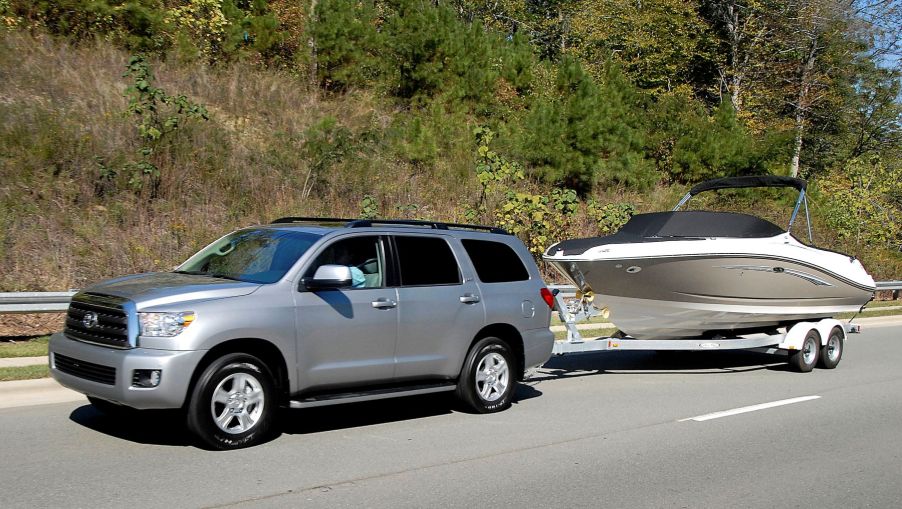
What Can You Tow With a 3,000-Pound Towing Capacity?
When we think of towing a trailer or a camper, big pickup trucks come to mind because they’re built with powerful engines and transmissions. Additionally, you can also usually find them with high towing capacity numbers. However, trucks aren’t the only haulers on the market.
Often you can find cars, SUVs, and even minivans on dealer lots ready to tackle a towing job, albeit a smaller one. So, what can you tow with a 3,000-pound capacity?
What you can tow with a 3,000-pound capacity

Believe it or not, a fair number of crossovers can handle towing in the 3,000-pound range. The first one that comes to mind is the Subaru Outback. With its standard AWD system and 8.7-inch ground clearance, it can pull 3,500 pounds behind it, according to Forbes.
Another vehicle with the same towing capacity as the Outback is the Honda Pilot. This vehicle comes with a high-quality rearview camera, the capability of seating up to 8 people, and has 46.8 cubic feet of cargo space to haul all those extras.
One surprising model on the list is the Chrysler Pacifica as a minivan model. It has the capability of hauling 3,600 pounds and comes with plenty of space for eight people. It also has an option to add AWD to your purchase and Stow ‘n Go storage for extra space.
What can you haul with the 3,000-pound towing capacity? You can pull a small boat, trailer, or a small, lightweight camper, such as a popup trailer. The only issue is that towing capacity will decrease depending on how much weight the vehicle has (people, fluids, and cargo) when you want to haul something.
How to find out what towing capacity your vehicle has
If you’re interested in towing with your vehicle, you’ll need to know how much the automobile can handle without causing damage to it. This will determine what type of trailer you use and how much weight you place on it. This is important because you could essentially damage your SUV if you exceed its towing capacity. Too much weight can destroy your suspension and possibly the structure of the vehicle.
With a powerful pickup, pulling 3,000 lbs isn’t going to be an issue, so you can confidently haul your trailer. However, with crossovers or minivans, towing capacity will be critical because you won’t have much leeway. To find out your vehicle’s towing capacity, look at the owner’s manual or the sticker on the driver’s door frame. Also, take note of the crossover’s GVWR (Gross Vehicle Weight Rating).
When you haul something with your SUV, you’re hauling more than just the trailer. You’re also pulling people, cargo, the weight of the vehicle, and fluids that make the car run. You’ll need to do some calculations to find out your true towing weight.
Check the vehicle’s curb weight on the VIN sticker located on the door frame (or sometimes on the side of the dash by the driver’s door). Add the weight of your passengers, cargo, and fuel in the car. Take that number, find the GCWR (Gross Combined Weight Rating) number (also located on the VIN sticker), and subtract the two figures. This will show how much you can safely haul without damaging the vehicle.
The truth behind some towing myths
Towing isn’t all that bad once you follow a few tips and get the hang of it. However, not all the information out there is accurate, so expect to wade through some myths to get to the truth.
Some common misconceptions concerning towing include being able to choose any hitch extension you want. Not all extensions are meant for all trailering jobs, though. You have to purchase one that works for your vehicle and for what you want to tow with it. The measurement of the one you buy has to match what’s required for the tongue weight of the hitch. If it doesn’t, you risk damaging your vehicle or the trailer.
Another myth is that you don’t have to perform maintenance on your trailers. While that sounds great, the truth is that to keep your trailer functioning properly, you need to service it at least once a year by packing fresh grease into the wheel bearings. Once the lubricant dries out, there will no longer be any lubrication, making the bearings wear out and break much more quickly than normal.
One of the worst misconceptions is that you can increase your towing capacity by replacing your hitch setup with an upgraded one. Manufacturers offer towing capacity calculations based on what the vehicle can safely do. Even with a powerful hitch, exceeding that number will not change the rating. If you try to tow a weight above what is recommended, you risk harming your SUV and trailer.
Towing can be safe, but you must ensure you follow what the automakers recommend for the brand’s vehicles. Don’t try to tow more than what your SUVs are rated for, or you could be spending a lot of money repairing the damage that can occur.


